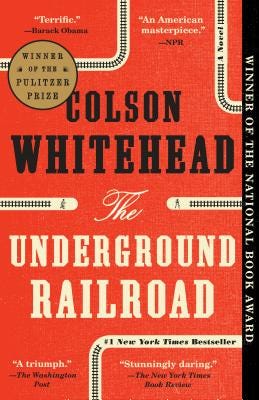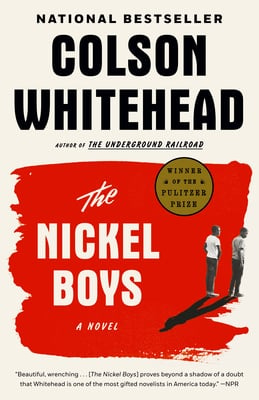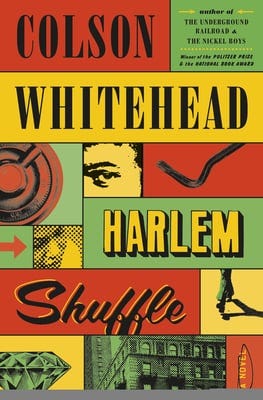Let’s get ready to reading rumble, my bookish besties, because it’s time for another "author vs author” head-to-head featuring a selection from your Pulitzer-Prize-Precious Colson Whitehead!
…
Yes, sorry, I have in fact gotten all the unnecessary alliterative flourishes out of my system for a week. Thank you for your understanding.
As a reminder, around these parts, “author vs author” does not pit different authors against each other because that would be churlish and dishonorable and against everything that books stand for. Instead, we look at a range of books by the same author to see which, if any, might appeal to you! (Check out past overviews for Taylor Jenkins Reid, Celeste Ng, and Yaa Gyassi.)
Like him or not, there are two things I can confidently say about Colson Whitehead:
Of authors working today, Colson Whitehead must be amongst the most versatile, exploring various styles, genres and messages, right? I look forward to his YA queer romance series and his decluttering how-to non-fiction, or whatever genre leap is next. Point is, the man does not lack imagination and that comes across in all today’s novels.
I feel like just about everything in the world right now is dumb (COVID, governments, emails, the new James Bond movie), but Colson Whitehead is - not. Colson Whitehead is smart, and his writing is smart, and evocative, and deliberately crafted. It’s not a light touch, exactly - somehow I always feel the sweat of it - but invariably you’re immersed in his environments.
So let’s get into today’s three head-to-head (to head)ers!
Forget the Pulitzer and the National Book Award - I know Whitehead has been breathlessly awaiting my take on The Underground Railroad. In a word: spectacular.
Power summary: Cora is a slave in Georgia who is offered a chance to flee via the Underground Railroad - which is actually a literal infrastructure not only connecting different states, but different scenarios of antebellum America. She attempts to remain free while being pursued across states by a slavecatcher.
What’s impactful and compelling about this novel is - everything, but specifically for me it is the sheer imagination, only partially rooted in historical fact, that brings the horrors to new life in ways both seemingly benign and immediately terrifying. The magical realism of the Underground Railroad allows Cora to experience vastly different (but consistently dangerous and brutal) experiences of escaped life. Hard to read but important, bold and unsettling.
In this, Colson Whitehead really has a dazzling palette of writing, with vivid word choices, phrases that put old thoughts in new light.
(Do you still want lamb ratings? This is a one-lamber. Excellent but brutal.)
So go ahead and follow up your first Pulitzer with a second, why dontcha, Colson? (One of only four writers to win two Pulitzers for fiction! Wow! Does he display plaques in his foyer? And, can you name the others? I myself 10000% could not but it’s at the end of this newsletter if you’re into pub trivia.)
Anyway, interestingly for an author who genre-jumps so much, The Nickel Boys is also a “based on a true story” imagining of another historical brutality.
Power summary: Based on the true story of a juvenile reform school that was actually a house of abuse (sexual, physical and mental), The Nickel Boys follows 1960s Elwood Curtis who’s unfairly sentenced to The Nickel Academy. He befriends a fellow “student,” Turner, who’s a cynic and rule breaker to Elwood’s optimist, “do your time” mentality and together their choices have long-term repercussions.
Once again, this lays bare the structural and individual legacies of race, power, and death that underpin our society, as well as how the traumas and choices of youth reverberate for life. And while it’s equally as well written, it’s much more plain-spoken, with less flourish. More economical with words.
I know a lot of people who prefer this to any of his other novels, and I get the appreciation, but for me personally, this was just pretty unrelentingly, grindingly grim and sad (and that is compared to a book about slavery.) And without the florid language, it was just perhaps a little too spare. But still very good and accomplished! Just not my favorite.
Also one lamb. Maybe a half lamby.
And now we get to Harlem Shuffle, his most recent novel, which is a heist/crime novel set in 1960s Harlem.
Power summary: Ray Carney owns a furniture store in Harlem and is only “slightly bent,” selling the occasional stolen good. When his cousin gets him involved with a failed heist, Carney becomes increasingly involved with crooked cops, crime syndicates, and the shady side of the city while also trying to make a better life for himself and his family.
I know people who DNF this book (hey, Danielle) but I really liked it - fast-paced, suspenseful, funny, surprisingly warm. A surprisingly fun crime novel with a (semi) reluctant protagonist who’s also a devoted family man and a colorful cast of characters. We also see a return of the writing word- floodgates, which means you can smell the worn carpet in the faded hotel and picture the 60s upholstery in Ray’s living room sets. I dug it.
The verdict
They’re all worth reading, but for me The Underground Railroad is the clear standout - important, (with Harlem Shuffle coming in strong if you want a smart but softer read.)
Love Colson Whitehead? Hate him? Recommend his zombie book instead? Let me hear it:
Other things to say:
If you read this far to learn the answer to “which three other authors have won two Pulitzers,” thanks! And the answer is:
Booth Tarkington (The Magnificent Ambroses in 1918 and Alice Adams in 1922)
William Faulkner (A Fable in 1955, The Reivers in 1963)
John Updike (Rabbit is Rich, 1982 & Rabbit at Rest, 1991)
Should we read all the Pulitzer winners? Would that be a newsletter that would interest you? I’m not actually sure it would interest me because when would we get to talk about celebrity memoirs? But worth considering.
Don't forget to check the archive for past genres ranging from non-fiction to YA to mystery to fantasy.
All links go to bookshop.org, which admittedly may not get you a book overnight but will support independent bookstores. You can view my entire catalog of recommendations here (any money made via these referral links will be donated to Defy Ventures.)
Lastly, wondering what those little lamb ratings are all about and what they have to do with Pulitzer-Prize wining novels? Here you go:












Yes! Recommend the zombie book! Not instead, but in addition.